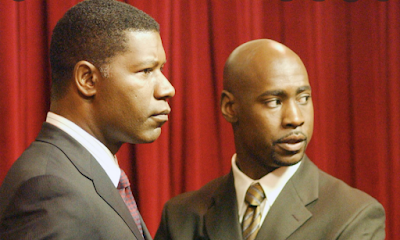It’s funny that what we consider sympathetic in a hero is very different from what we find sympathetic in real life. We want our friends to be sensible, but we have very little patience for sensibility in fiction. We want our heroes to be willful. This doesn’t mean that every hero needs to be brashly defiant. There are a lot of ways for heroes to stand up for themselves.
- Sometimes, yes, heroes will engage in angry confrontation.
- Other times, they subtly mock or impeach what the other character is saying.
- Sometimes they’ll just quietly and brazenly ignore all opposition, which is a more direct type of defiance.
- Weaker characters may acquiesce but mutter sarcastic asides as they do it.
- In some cases, heroes fail to stand up for themselves, but they at least get their own say in first-person narration or voice-over. If characters won’t hold their own in person, they at least let us know about their defiance.
Our urge to see heroes defy authority can go to ludicrous extremes. The producers of 24 joked that whenever a script came in short, they had one stock scene they could use repeatedly because the audience would love it every time. Before President Palmer took whatever action he had decided to take, they’d have one of his aides run up to him and say, “Mr. President, wait! We just got some new poll numbers about this issue, and everybody disagrees with what you’re about to do!” Palmer would consider this gravely for about five seconds, then issue a stentorian statement: “I don’t care if they impeach me—it’s the right thing to do.” With that, he would boldly stride off into the situation room while his aide’s mouth hung agape.
Is this how we want a president to act in real life? Absolutely not. In real life, when presidents double down on their current agenda, even after the polls are screaming for them to reverse course, the American people become dispirited and depressed, and we blame their intransigence on corruption. But in our fiction, it’s a different story.
Compare this to later seasons of 24, in which President Palmer’s more pliable, poll-following brother inherited the Oval Office. He was perfectly nice, but the audience hated that guy. We all dream of saying no to our boss, and we want our fictional heroes to live that dream, even if the hero’s boss happens to be the American people.
The 40 Year Old Virgin | YES. “I’m tired of saying the word ‘pussy’!” |
Alien | Sort of. She’s very hesitant to speak up at first, to the degree that we don’t even guess she’s the ultimate hero. She lets herself be steamrolled over when she tries to maintain quarantine, for instance…but she gradually becomes more and more assertive as she grows into her hero role. |
An Education | YES. In muttered sarcastic asides, yes. |
The Babadook | YES. Very directly. |
Blazing Saddles | YES. Gladly. And when it’s not safe to tell them that to their face, he turns to us and tells us. |
Blue Velvet | NO. He’s polite and softspoken, hiding his internal turmoil. He certainly has qualities that those around him lack, but he’s in no hurry to let them know that out loud. His roiling internal contradictions become clear to us through his shocking actions, not because he speaks up to share his unique point of view. |
The Bourne Identity | YES. He’s reluctant to speak up, but quick to act, so he’s assertive in his own way. |
Bridesmaids | YES. in a petulant-mumbled-aside kind of way. |
Casablanca | YES. he has a razor-sharp rapier wit |
Chinatown | YES. Very much so. He’s openky surly and defiant of everyone. |
Donnie Brasco | Yes and no. In the mob, he lacks a forceful personality. This is in fact the secret of his success: his ability to blend into the background. He mostly keeps his own counsel until directly confronted. Outside the mob, however, he’s quick to complain and mock his bosses’ incompetence. |
Do the Right Thing | YES. Yes, he stands up to both Pino and Buggin’ Out, trying to chill them both out. |
The Farewell | YES. Many times |
The Fighter | Yes and no. He’s very reluctant to, but he speaks up for himself at several key points. |
Frozen | YES. Sort of. Like so many heroines, she is the master of the muttered aside. |
The Fugitive | YES. Not verbally, but he pointed refuses to stop doing what he’s doing whenever others tell him to back off. |
Get Out | YES. He gently points out to Rose her seeming naivete, but mainly just reacts to everyone with pointedly-quizzical looks. He laughs off Rod. |
Groundhog Day | YES. Constantly. |
How to Train Your Dragon | YES. but only in muttered asides. |
In a Lonely Place | YES. Very much so, he has a razor-sharp rapier wit |
Iron Man | YES. Very much so. He verbally humiliates friends and enemies alike. |
Lady Bird | YES. Not so much with her friend (which is good), but certainly with her family. |
Raising Arizona | NO. he’s reluctant to criticize |
Rushmore | YES. |
Selma | YES. He’s an expert at standing up for himself while still molifying his opponent, whether it be SNCC or Johnson. |
The Shining | YES. Jack, yes: he’s a snapping, snarling beast. Danny: no. |
Sideways | YES. He has a withering, sharp wit. |
The Silence of the Lambs | YES. Stands up for herself in a humble but definite way. |
Star Wars | YES. He doesn’t boast about the force, but he certainly boasts about his home-grown shooting abilities. |
Sunset Boulevard | YES. he has a razor-sharp rapier wit. |


No comments:
Post a Comment